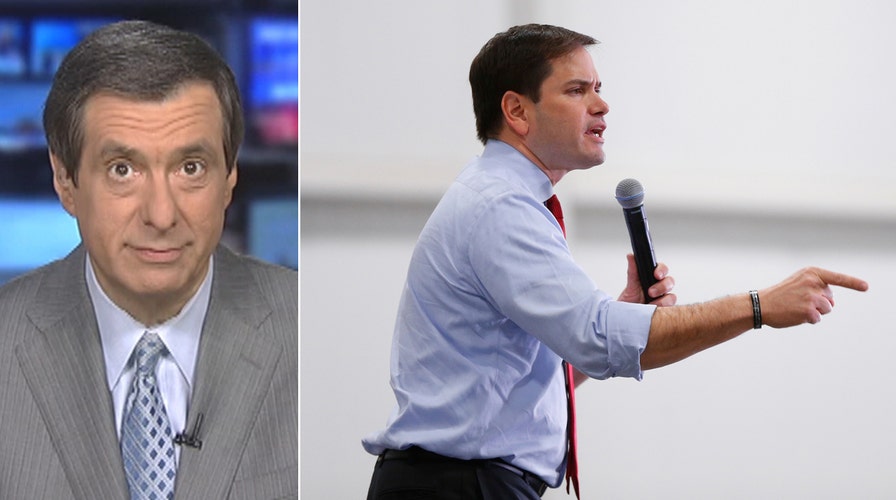Kurtz: Rubio campaign rips CNN
'MediaBuzz' host reacts to spat between Rubio camp and CNN over report the Florida senator was being advised to drop out of the 2016 race
The Republican primary contest has become the great dropout derby.
The media are obsessed with who’s getting out, and when, and some are giving the reluctant candidates a nudge.
Nowhere was this more evident than in the confrontation between the Marco Rubio campaign and CNN.
The network reported, according to “sources,” that a battle was raging within the Rubio campaign over whether the senator should drop out before next Tuesday’s Florida primary, which Donald Trump is leading in the polls.
In the report, Jamie Gangel quoted “a source familiar with the discussions” as saying that Rubio “doesn’t want to get killed in his home state,” and that “a poor showing would be a risk and hurt his political future.”
Alex Conant, Rubio’s communications director, told me yesterday that he was blindsided by the story. “I called everyone I knew over there and said, what is this? They didn’t even reach out for comment before going on air, and it’s utterly false.”
Conant told me he called several people at CNN, hopped in a taxi and went to the Washington bureau, where he went on the air with Wolf Blitzer and called the report “fiction.”
Conant says he was later bumped from a previously scheduled appearance with Anderson Cooper that evening—bumped so late that he was in a car outside the Capitol Hill bureau, waiting to see if he could get on.
Gangel, while noting Conant’s denial, told viewers that “we double-checked with our source who confirmed that our story was 100 percent correct.”
CNN says in a statement that there were multiple sources for the story, not one. But the network had a responsibility to ask the Rubio folks for comment before airing such a potentially damaging story.
The thing about unnamed “advisers” is that they could be part of a campaign’s innermost circle or outside kibitzers who check in once in awhile. But CNN is confident that its sources are sufficiently high-level and genuinely concerned about Rubio's future. What's more, it hasn't escaped anyone's notice that the Rubio campaign is fundraising off the incident.
And the impact of such stories is amplified by the hundreds of outlets that pick it up, in this case on the day before the voting in Michigan and three other states. “For people to wake up and see the banner of Drudge with a false report is not helpful,” Conant told me.
Meanwhile, some Cruz supporters in Hawaii got e-mails or saw social media posts about Rubio and the CNN report, reminiscent of the Cruz camp jumping the gun in Iowa about Ben Carson possibly quitting, prompting an apology from the senator. In this case, a campaign statement said that these actions were “not sanctioned by the Cruz for President campaign” but were done by “some volunteers.” The campaign said these people have been contacted and told to remove the material.
There’s a larger issue here, and it has to do with the media drumbeat for whether a candidate—which can become so loud that it drowns out the person’s message and hastens the process.
The Jeb Bush death watch became such a prominent feature of his coverage that it seemed almost anti-climactic when he quit on the night of the South Carolina primary.
Rubio’s situation isn’t as dire, but naturally his poor performance in the last several contests has given rise to such talk—especially with Ted Cruz suggesting his Senate colleague consider dropping out and Donald Trump urging Rubio to do so.
And this takes on heightened importance because of the GOP’s stop-Trump movement. If Rubio wins Florida, where he’s trailing Trump by 8 points in the latest poll, he can probably stay in the race. The same goes for John Kasich with Ohio. And that would probably deny Trump the 1,237 delegates he needs to win this thing before Cleveland.
But if Rubio can’t win his home state, his campaign is almost definitely over, and his political career might be jeopardized as well.
So what he does in the next week is a legitimate story. But in fairness to Rubio, the media need to give him a chance to make his case, and not just hound him over why he’s still in the race.
So here’s a novel suggestion: Why don’t we let the voters decide?





